Flourishing Empires: Greece and Persia (unit 3)
Welcome to Greece and Persia
- the HTCs that we will emphasize in this unit are causes and consequences, historical perspectives and primary evidence.
Introduction to Greece
Minds On: what criteria can we use/build to determine what is or is not democratic? This will be a crucial exercise as we move through the unit and explore democracy. We’ll have to keep historical perspective, presentism and ethics in mind.
Historical_Perspectives_on_Democracy
Interesting articles to read, if you wish (I got some of my criteria for democracy from these articles):
- Macleans article by David Moscrop: “Canada is a great democracy. But you need to understand it.” April 16, 2017.
- The Economist Intelligence Unit’s Index of Democracy by Laza Kekic. 2007.
CHW3M_Intro_Greece_Quad3 (slides)
If you’re really interested in Greece’s early history, check this out: Nat_Geo_The_Greeks_videos_transcribed
Task: Use pages 109 to 113 in the textbook to answer how each of the following could have contributed to ending the dark ages (time when society did not flourish):
- Alphabet (through trade with the Phoenicians)
- Olympics
- Homer’s works (The Iliad, The Odyssey)
- Colonies
If you’d like, watch this short National Geographic video on Greece: Ancient Greece 101.
Was Athenian Government Democratic?
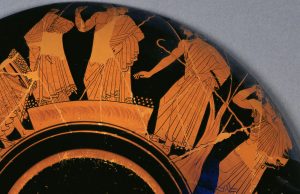
CHW3M_Athenian_Democracy_Quad3_2020 (slides)
Athenian democracy ranking activity: CHW3M_Athenian_Democracy_Ranking: rank the top 7 contributions to democracy. Make sure you can justify your choices. If you need more information, see the textbook chapter on Greece and the PPT above.
Potential Follow-Up: Choose one (not your #1) of your top 7 and explain how it contributed to democracy in Athens. Be sure to explain thoroughly.
- be direct in answering the question; get to the point, don’t assume the reader knows anything
- use causal language (underlying, triggered, indirectly, directly, paved the way for, resulted in, etc.)
- use your prior knowledge (show what you know what about Athenian democracy)
Task: Take brief notes on Persian Wars, pages 119-123 in textbook, emphasizing cause-consequence relationships under these headings:
- Ionian revolt
- battle of Marathon
- Athens builds ships
- Thermopylae
- Salamis and Plataea
If you’re interested, watch this episode of Crash Course History on The Persians and The Greeks. 11 minutes.
Greek Women
HTC = primary evidence, historical perspectives
Task: Fill in Greece column on Comparison of Women in Three Civs chart using pages 152-153 in the textbook. Briefly. Comparison of Women Across Three Civs
Greek Women primary source evidence exercise (see PPT below). For each object on the PPT below, identify what the women are doing, how they are dressed, where they are. Make inferences using red light (for guessing), yellow light (for possibility) and green light (for certainty).
Greek_Women_Quad3_2020-21 (PPT)
We noted that both primary and secondary evidence can be biased.
Ms. G read the Aristotle PSD aloud (in handout package) and students annotated it. We focused on the contrast between women’s responsibilities and men’s power/control.
Aristotle excerpt from On a Good Wife
- Hints on making interpretations (inferences).
- Make sure they are actual inferences, not summaries or paraphrases of what he wrote.
- Tell the reader what you think Aristotle really meant!
- I think he meant that…
- He valued…
- He believed…
- He seemed to feel that…
- He seemed to think that…
Choose your degree of certainty carefully. Think about all you have learned about how to use an appropriate tone of probability. Red yellow green
Task: CHW3M_Greek_Women_Follow-Up_2020-21
Athens-Sparta Debate
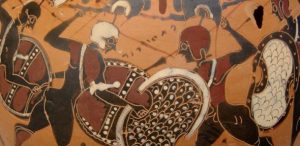
- Read “Pericles’ Funeral Oration” PSD in handout package.
- Read the introductory blurb to see how the situation might have affected the speech. (I.e., it matters who the speech was given to and in the middle of which war vs. someone important).
- Highlight or underline words that show Pericles’ biases (preconceived opinions) on government, leisure time, culture and art, and role of women:
- favourable – things he likes and boasts about – Athens
- against – things he’s critical of (read between the lines – of Sparta)
- Read “Athens” worksheets in your handout package and answer questions 1a,b,c, 2a,b,d, 3a, b, 4a, 5a in your notes.
- Read “Sparta” worksheets in your handout package and answer questions 1,2a,b, 3a,b, 4a,b,c, 5 in your notes.
- Take notes on Sparta from textbook, 117-119.
Athens-Sparta Debate. In-role: defend which state had the better way of life and how that made their city-state flourish. That means you need to think from the perspective of Athenians and Spartans. It’s an in-role debate.
Identify values of each city-state:
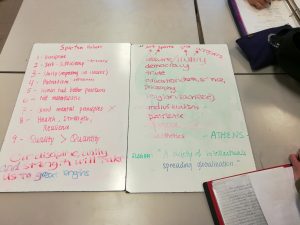
(courtesy of Nebyou, 2018)
Athens vs. Sparta Assignment
See tip page.
Persia – how was it ruled?
Minds On: “The Persians” (handout) shows how the Persian Empire was quite different from what the Greeks thought of it. Why are we stopping to study Persia in a unit on Greece?
- Remember the Persian Wars?
- Persia was the largest empire at the time.
- The Greeks were biased against the Persians so we can’t take their words as fact.
Looking at the maps:
- How do you think the Persian Empire came to be so large?
- Who did they conquer?
Definitions:
empire = a large territory controlled by one power (usually starts with a home territory and expands out to conquer other peoples)
tribute = offering goods/services to a ruler for the privilege of having good relations
circa = approximately, around (usually used with dates)
corroboration = to seek other evidence to support (or oppose) a view, usually in a PSD (primary source document).
Notes on the Persian Empire exercise: Persians (3-page handout)
This is an overview of Achaemenid Persian Empire that you are going to annotate with themes.
- expansion by military conquest
- state religion (of the Persians)
- diplomacy with outsiders
- cultural tolerance, including freedom of religion
- women had some rights
- rebellions – non-Persians felt disrespected?
Especially pay attention to the PSD* excerpts by Cyrus (top of page 2) and about the building of Darius’s new palace (bottom of page 2, top of page 3).
*primary source document
Freedom and Control
The tension between freedom and control in the Persian Empire (complete freedom = 0, complete control = 10).
5 = controlled freedom
CHW3M_Persian_Empire_freedom_control
- worksheet to help you see this relationship in the Persian Empire
Task: Take notes on philosophy, sophists, Socrates, Plato, Aristotle from 145-147 if not already done.
Alexander the Great and Cultural Interaction
Overview of the rise of Macedonia and Alexander “the Great.”
Hellenism = the mixing of Greek and Persian cultures
Activities:
- categorize all the events on the Alexander the Great Activity handout.
- look for patterns in H (for political purposes) and MC (true acceptance of other cultures)
True MC keywords:
- tolerant
- open-minded
- inclusive
MC for political purposes keywords: (to be H it has to involve interaction between cultures)
- calculating
- manipulative
- strategic
- controlling
- cunning
- sneaky

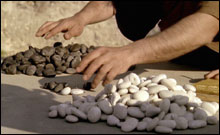
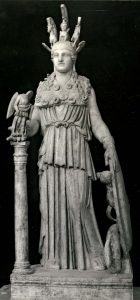
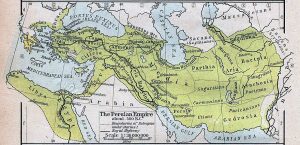
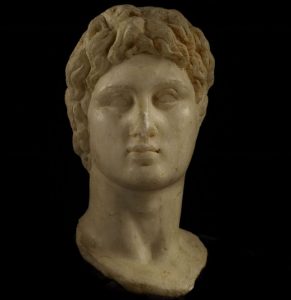
[…] (If you want to see how I created a structure to teach them how to think, see my teaching blog under the Tues. Oct. 16 date – the document is called Help with Greek Women […]
[…] you’d like to see my entire set of data from Statistics Canada, go to my teaching blog, look under Fri. Oct. 12 for Historical Perspectives On […]